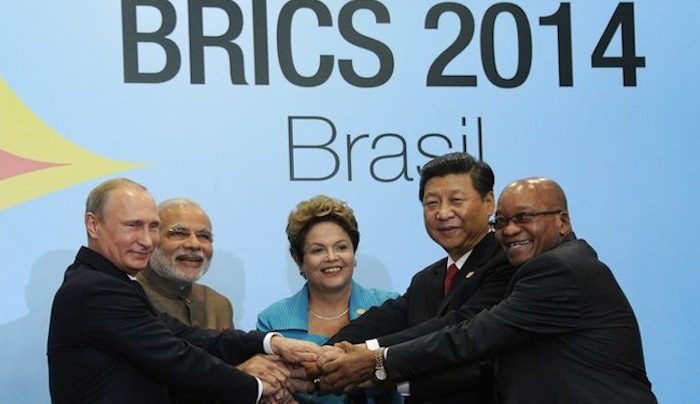
Russian President Vladimir Putin undertook a six-day visit to four countries in Latin America from 11 to 16 July. His tour came at a time when both Russia and the countries he visited – Cuba, Nicaragua, Argentina, and Brazil – were looking for diplomatic support. Russia, of course, is facing sizeable opposition from the West for its intervention in Ukraine. Thus, Russia is keen to deepen its ties with other parts of the world and in Latin America several countries have given their support to Russia, and many have long-standing links with Russia and before that the Soviet Union.
Meanwhile, the four Latin American countries have been buffeted by events which make them more open to Russian overtures. For instance, Cuba’s economic reform programme is still only making slow progress, while the strong financial support from Venezuela is looking vulnerable as a result of the weakness of President Nicolas Maduro. In Argentina, the impact of the recent debt default means foreign investment is increasingly limited, while in Brazil relations with the US have been damaged by the wiretapping scandal involving President Dilma Rouseff. So for a variety reasons, as well as a more general disengagement by the US in the region, there is now more space for deepening relations with Russia.
A range of agreements were signed during Putin’s tour. In Cuba, there was confirmation that Russia had written-off US$32 billion of Cuba’s Soviet era debt. Further, 10 bilateral economic and commercial agreements were signed in areas including health, energy, and transport. In Nicaragua, discussions between Putin and President Daniel Ortega focused on a range of issues including the delivery of agricultural machinery; the importation of wheat; arms transfers; constructing a new Russian Navy facility; and the possible placement of GLONASS high altitude satellite navigations systems on Nicaraguan territory. In Argentina, there were agreements on nuclear energy cooperation and assistance in constructing new hydro-power plants; treaties on mutual legal assistance, the transfer of prisoners, and extradition; and on media cooperation. In Brazil, Putin and Rousseff discussed industrial cooperation and arms sales.
However, the most important part of Putin’s visit was his participation in a summit of the BRICS (Brazil, Russia, India, China and South Africa) on 15 July. At this meeting the countries signed an agreement to create the BRICS Development Bank with a starting capital of US$50 billion, and the US$100 billion Contingent Reserve Arrangement (CRA) to help members in financial difficulties. It was suggested that these institutions would be more sympathetic to developing countries than either the IMF or World Bank.
The question is whether Putin’s visit will lead to a step-change in relations with Latin America? The short answer is probably not. Diplomatically the trip was important. It highlighted Russia’s reach beyond Europe into the ‘backyard’ of the US, and its efforts to win new friends and rebuild old alliances. It also illustrated that Russia had some support for its policy vis-à-vis Ukraine. However, Latin America has long defended the principle of non-intervention and so there is reluctance to back Russia too whole-heartedly.
Strategically, important agreements were signed between Russia and the Latin American countries that will strengthen links and increase Russia’s influence in the region. Arms sales and energy cooperation are key planks in the relationship. In addition, there are growing opportunities for Latin American countries to supply agricultural products to Russia since US/EU sanctions were imposed. However, Russia’s involvement is starting from a very low base, particularly in relation to trade and investment, and so for the region relations with China, the US, and the EU are still much more important. Further, with the possible exception of Nicaragua, the region is cautious of allying itself too closely with Russia. They do not wish to risk their links with the West. Even Cuba is taking a careful approach having been over-reliant on the Soviet Union in the past.
The deals between the BRICS are potentially important and Putin spoke about raising the group’s profile, improving political cooperation, and using the group to counterbalance the influence of the US. However, the Development Bank and the CRA have limited capacity; the lending conditions of the CRA have yet to be established; and the BRICS more generally do not necessarily have much in common. Thus it is far too early to say whether the group will become the coherent and effective international player that Putin would like it to be.
Further Reading on E-International Relations
- China-Latin America Cooperation: An Alternative for Autonomy and Development?
- A Tale of Two Attitudes Toward Leftist Governments in Latin America
- Overcoming the Greatest Distance: China in Latin America
- Latin America and China: Reflections on the 70th Anniversary of the PRC
- Opinion — US Policies towards Latin America: What to Expect from the November Elections
- Latin American Regionalism Under the New Right